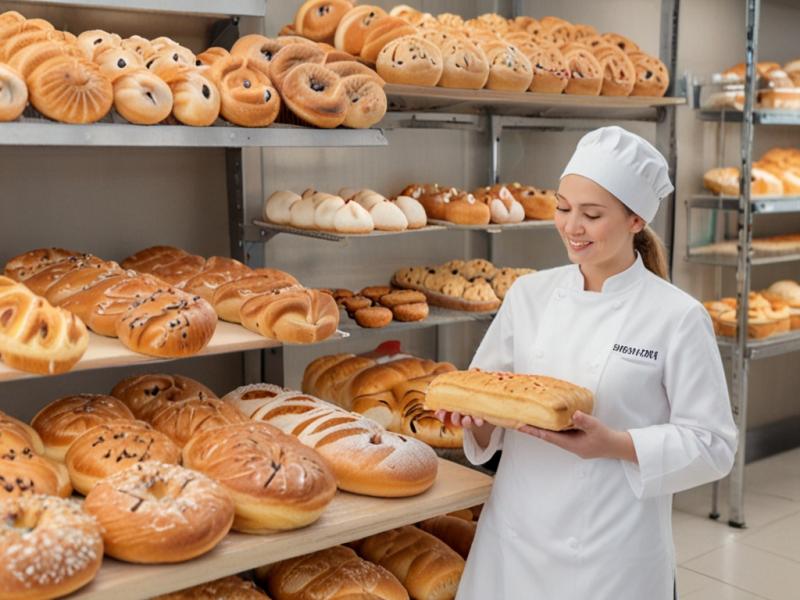Market Trends in Canada’s Bakery Industry: A Comprehensive Guide

1. Overview of Canada’s Bakery Industry
The bakery industry in Canada is a dynamic and vital part of the country's food sector. Defined by a rich tradition of baking that spans bread, pastries, cakes, and more, the industry has evolved significantly over the years. It includes a wide array of key players ranging from large-scale commercial bakeries to small, artisanal establishments.
Historically, bakeries have been central to communities across Canada, serving as more than just food producers. Over time, the demand for diverse baked goods has increased, leading to innovations in ingredients and techniques. Companies like Weston Foods, Canada Bread, and various independent bakeries shape the landscape, providing both traditional and modern baked goods.
2. Current Market Size and Growth Rate
The Canadian bakery market is valued at approximately $8 billion, growing steadily year-on-year. This growth is driven by both the demand for staple products like bread and the increasing consumer preference for premium, health-conscious items. In 2023, the market experienced a growth rate of 3.5%, highlighting the industry's resilience and adaptability.
3. Consumer Preferences in Canadian Bakeries
Consumers in Canada have shifted towards healthier choices in their food consumption. In bakeries, this trend is reflected in the growing demand for whole-grain, low-sugar, and gluten-free products. The rise of “free-from” categories—free from artificial preservatives, additives, and allergens—is a notable driver in bakery product trends. Flavors such as vanilla, cinnamon, and chocolate remain popular, while exotic ingredients like matcha and lavender are making their way into the market.
4. The Impact of COVID-19 on the Bakery Sector
COVID-19 brought significant disruption to the bakery sector. With lockdowns and supply chain issues, bakeries had to adjust to changing consumer demands, including a shift towards online ordering and delivery services. Smaller bakeries faced unique challenges, such as maintaining operations with limited staff and resources, while larger bakeries pivoted to e-commerce and home delivery to meet the rising demand for comfort food during the pandemic.
5. Rise of Artisan and Specialty Bakeries
In recent years, there has been a notable rise in artisan and specialty bakeries across Canada. Consumers are willing to pay a premium for organic, gluten-free, and locally sourced products. The demand for authentic, handcrafted goods has led to a proliferation of small, boutique bakeries that focus on quality over quantity. Innovation plays a big role here, as bakeries experiment with unique combinations of flavors, ingredients, and production methods to stand out in a competitive market.
6. Sustainability in Bakery Packaging
Sustainability has become a top priority for consumers and businesses alike. Eco-friendly bakery packaging solutions, such as biodegradable and compostable materials, are becoming increasingly popular. Additionally, there is growing pressure from government regulations that aim to reduce the environmental footprint of packaging waste in the food industry. Bakeries are exploring reusable packaging and investing in sustainable practices to meet both consumer expectations and regulatory standards.
7. Bakery Supply Chain Management in Canada
The sourcing of high-quality, local ingredients has become a key focus for bakeries across Canada. Supporting local farmers and suppliers helps ensure freshness and aligns with the broader trend of sustainability. However, logistic challenges, such as transportation costs and seasonal availability of certain ingredients, can affect supply chains. Many bakeries are addressing these issues by building closer relationships with local producers and adopting more flexible supply chain strategies.
8. Innovation in Bakery Products
Innovation in the bakery industry is essential to meet changing consumer expectations. The use of alternative flours, such as almond, chickpea, and coconut flour, has gained popularity due to the rising demand for gluten-free products. Additionally, plant-based ingredients are finding their way into bakery items, appealing to vegan and health-conscious consumers.
9. Technology in Canadian Bakeries
Technology is transforming the bakery industry in Canada, with automation and robotics enhancing productivity and efficiency. Many bakeries now use automated machines for tasks like dough mixing and bread slicing, reducing the reliance on manual labor. Additionally, online platforms have become essential for sales, allowing bakeries to reach a broader audience through e-commerce and home delivery services.
10. Regulatory Compliance and Safety Standards
Compliance with food safety regulations is crucial for bakeries in Canada. Health Canada mandates strict guidelines for hygiene, labeling, and production processes. Bakeries must also ensure proper allergen labeling, especially as more consumers are looking for products that are free from specific ingredients, like gluten or nuts.
11. Regional Market Differences
There are notable regional differences in bakery trends across Canada. In Toronto, for example, there is a strong demand for diverse, multicultural baked goods, reflecting the city’s vibrant food culture. Meanwhile, in Western Canada, organic and health-focused products dominate the market, as consumers prioritize wholesome, locally sourced ingredients.
12. Labor and Staffing Trends
Staffing remains a challenge for many bakeries, with a shortage of skilled bakers and pastry chefs affecting operations. The rise of temporary staffing solutions has helped mitigate these issues, allowing bakeries to maintain production levels during busy periods. At the same time, many businesses are investing in training programs to build a more skilled workforce.
13. Challenges and Opportunities in Canada’s Bakery Industry
Like many industries, bakeries face a number of challenges, including rising ingredient costs, labor shortages, and changing consumer preferences. However, there are also numerous opportunities, especially for bakeries that embrace innovation and sustainability. Those that can offer unique, high-quality products will continue to thrive in this competitive market.
14. The Role of Social Media and Marketing
Social media has become an essential marketing tool for bakeries. Platforms like Instagram and Facebook allow bakeries to showcase their products and engage directly with customers. Digital marketing strategies, including influencer collaborations and targeted ads, are helping bakeries reach a wider audience and build brand loyalty.
15. Future Market Trends in Canada’s Bakery Industry
Looking ahead, the bakery industry in Canada is expected to continue growing, with an increased focus on health-conscious and sustainable products. The next 5-10 years will likely see further innovation in both product offerings and production techniques, as bakeries adapt to meet evolving consumer demands.
Frequently Asked Questions
What is the current value of the bakery industry in Canada? The bakery industry in Canada is valued at around $8 billion.
How has COVID-19 impacted Canadian bakeries? COVID-19 led to significant shifts in consumer behavior, with a greater emphasis on online ordering and delivery services.
What are the most popular bakery trends in Canada? Artisan and specialty products, as well as health-conscious options like gluten-free and organic goods, are currently trending.
Are Canadian bakeries adopting eco-friendly practices? Yes, many bakeries are adopting eco-friendly packaging and sourcing local ingredients to reduce their environmental impact.
How are Canadian bakeries using technology? Bakeries are increasingly using automation and online platforms to streamline operations and enhance customer reach.
What are the biggest challenges for Canadian bakeries? Rising ingredient costs, labor shortages, and the need to meet changing consumer demands are among the biggest challenges.










Comments (1)
Sofia Alice
6
Consultant
This post is so insightful! I love how you broke down complex ideas into easy-to-understand concepts